#Down Syndrome Diagnosis
Explore tagged Tumblr posts
Text
What is Down Syndrome? Causes, Symptoms and Treatment | Solh Wellness
Down syndrome, also known as trisomy 21, is a genetic condition that occurs when a person has a complete or partial extra copy of chromosome 21. This disorder is distinguished by distinct physical characteristics, an increased risk of specific medical issues, and varying cognitive and developmental delays.

Causes of Down Syndrome
Individuals' causes of Down syndrome can vary depending on a number of factors. The following are the major Down Syndrome Causes discovered thus far:
Chromosomal Disruptions: Down syndrome is a genetic disorder caused by an extra copy of chromosome 21 in the individual's DNA. Normally, each chromosome has two copies, but people with Down syndrome have three copies of chromosome 21. This extra genetic material can result in a variety of physical and developmental traits, such as distinct facial features, intellectual disabilities, and an increased risk of certain health conditions.
Maternal Age: Women over the age of 35 are more likely than younger women to have a child with Down syndrome. This is due to the fact that the risk of chromosomal abnormalities, such as non-disjunction, increases with age in women. In younger women, the risk of having a baby with Down syndrome is low, but it rises with age.
Translocation: In some cases, a genetic rearrangement known as translocation causes Down syndrome. Translocation is the breaking of a chromosome 21 segment that then attaches to another chromosome. The individual may have three copies of chromosome 21 or a portion of it as a result of this rearrangement, resulting in Down syndrome symptoms and health concerns.
Diagnosis of Down Syndrome
Down Syndrome symptoms are easily identified in many cases. Down syndrome physical characteristics such as a round face, upturned eyes, and a short, stocky build are frequently used to identify the disorder. Individuals with Down syndrome may also exhibit clumsy movements due to low muscle tone or hypotonia, which can impede physical development. These physical characteristics are considered indicators of Down syndrome rather than symptoms. They can be discovered after a child is born or, in some cases, during pregnancy. It is common for healthcare providers and parents to examine this Down syndrome diagnosis early in order to facilitate early interventions and treatments.
Down Syndrome Difficulties
Cognitive: Individuals with Down syndrome may experience delays in cognitive abilities such as memory, attention, and problem-solving.
Language Barrier: Many people with Down syndrome struggle with speech and language and may require additional communication assistance.
Learning Difficulties: People with Down syndrome frequently struggle in school and may benefit from specialised instruction.
Deficits in executive function: People with Down syndrome may struggle to initiate tasks, plan ahead of time, and organise their thoughts.
Down Syndrome Treatment
In the future, most children with Down syndrome will benefit from mental health therapy. The primary goal of providing mental health therapies to these children is to make them as self-sufficient as possible when they grow up. Early intervention is a collection of therapies and exercises aimed at assisting people with Down Syndrome who are developing slowly. Three types of medications are used to treat Down syndrome.
Physical Therapy: Babies with Down syndrome frequently have low muscle tone, also known as hypotonia, which can impede physical development and lead to later-life issues such as poor posture. Physical therapy can help with this by improving muscle tone and strength as well as teaching them how to move their bodies properly for daily activities. This intervention may help them improve their overall physical functioning and avoid future complications.
Speech Therapy: Due to features such as small mouths and enlarged tongues, which are more pronounced in hypotonia, children with Down syndrome may have difficulty speaking clearly. Furthermore, hearing loss can have an impact on speech development. Speech therapy can help children with Down syndrome overcome these obstacles and improve their communication skills. Some children may benefit from learning and using sign language as well.
Occupational Therapy: This type of therapy assists people in developing skills that will benefit them in future endeavours while also allowing them to be as self-sufficient as possible.
Conclusion
Coping with Down Syndrome can be difficult for a person's family, friends, and close ones. Early intervention is the most effective treatment for this disorder. If you or a loved one is suffering from a similar condition, please contact Solh Wellness. Over 200 mental health practitioners and Allied therapies are available to assist you on your healing journey. Download the Solh Wellness App to assist your family members.
#Down Syndrome#Down Syndrome Causes#Down Syndrome Symptoms#Down Syndrome Treatment#Down Syndrome Diagnosis#Mental Health Therapy#Mental Health Awareness
0 notes
Text
#autism#autistic#autistic joy#neurodivergent#neurodiversity#actually neurodiverse#actually autistic#autistic experiences#adhd#self diagnosis#dyslexia#schizophrenia#osdd#did#dissociative identity disorder#partial dissociative identity disorder#ptsd#fibromyalgia#down syndrome
626 notes
·
View notes
Text
I wholeheartedly believe our family is better and stronger for having children with disabilities. Most days are just a beautiful normal, and I feel as if I’ve stepped out of the ‘rat race’ onto a more peaceful, leisurely path that is filled with all kinds of beauty. It’s as if I never realized I was colorblind until I put on glasses that showed me color.
18 notes
·
View notes
Text
I'm super visual when reading books and usually see the whole thing playing like a movie in my head, and when I first read the PJO books I had a very clear mental picture of Percy, but this time around it's much more blurry... cause Percy's kind of just faded into me in my mind.
#i think it's crucial that i first read these books the summer before my first big school related break down#the age when my goodkid.mp3 syndrome really caught up with me#cause it was really the start of me figuring that part of myself out#and that journey didn't really come into a full picture until 3 years later when i got my autism and adhd diagnosis#and didn't really end until this year when i finally learned to stop feeling guilty over when my neurodivergentsies became hard for people#to deal with#and i started getting mad at people for having a problem with them instead of apologetic for inconveniencing them#like... i don't think 14 year old me saw herself as particularly similar to percy but there was clearly a subconscious recognition there#that made me love the books so much#leave it to me to turn everything into a narrative but it really feels meant to be that i returned to these books this year#it's making the whole thing come full circle#mal rereads pjo#pjo#percy jackson#personal
7 notes
·
View notes
Note
thanks for adding that information to the post about down syndrome. it was correct, informative and well written
not sure how well written it was because i just typed it up quickly, but i’m glad you appreciate it. the way people talk about intellectual disability and conditions associated with it are so behind so much of the advocacy and acceptance on this site and it really frustrates me.
the idea that people with down syndrome can live independently and make choices for themselves because ‘most of them have a “normal intelligence”’ is fucked up. people don’t have to fit your (general) definition of ‘normal’ to deserve respect and dignity and to be able to make important choices about their own lives. disabled people don’t have to meet a certain threshold of ‘normality’ to be treated as people.
what gets me is that…..intellectual disability is COMMON. it’s 2-3% of people (compare to autism, which everyone talks about ‘becoming more common’; it’s about 1%). but people get caught up in the outdated idea of ‘mental age’ and just can’t picture an adult going about their life and doing everything that anyone else would do while also having ID.
and of course some can’t do all that and those people shouldn’t be dismissed, but the picture we have of ID (and down syndrome, in this specific case) should be a full picture. you don’t have to be einstein to own a house or drink alcohol or have sex or get a degree or raise a child or look after your own money.
i know i’m being really repetitive but it’s just. ughhh. why do people need to imagine that a video about people with down syndrome having autonomy and making adult choices is about how actually they’re not disabled after all! as if a person’s general cognitive abilities dictate how much respect they deserve.
and, in case i’m giving the wrong impression here, the most profoundly intellectually disabled person who needs 24/7 care for the most ‘basic’ of needs deserves just as much respect and autonomy. they deserve as much control over their lives as is physically possible. no ‘but what about…’ they’re people. they’re real human people and, as adults, are just as entitled to be adults as anyone.
you should NEVER assume someone can’t do something because of a diagnosis.
#personal#gonna stop before i write the same paragraph over and over with slightly different wording lmao. it’s just GAHHHHHHHH#LEARN WHAT INTELLECTUAL DISABILITY IS#apply all this work you’ve done to normalise autism to ID as well#well maybe not all of it. some of you are fucking weird about autism. but you know what i mean#intellectual disability#down syndrome#i don’t mean to equate DS and ID. too many people already do that#there are so many potential causes of ID and there are people with DS who don’t meet the full criteria for ID#this is all just in reference to a conversation specifically discussing the comorbidity and treating people with DS different based on—#—whether or not they’re assumed to have an ID diagnosis#anyway. ID is something i am EXTREMELY passionate about
1 note
·
View note
Text
So I got a hEDS diagnosis, competent AND nice doctor, short term pain management considerations, long term pain management considerations, and further investigations to be thorough? All from the one doctor in one appointment? Which I got safety net rebate on? This disability pride month?
It’s more likely than you think.
#the ups and downs of chronic illness#chronic illness#heds#ehlers danlos syndrome#invisible illness#we Stan my new rheum#even tho I traveled 4 hrs across states to see him it was a wise decision#and yeah can we just appreciate he took me at my word#I’m so used to being questioned and like#interrogated by my doctors in an ~I don’t believe you ~ kind of way#that the unproblematicness of this appointment has me doubting the validity of the diagnosis#though. I clearly have issues#so it fits#but it feels like I conned my way into it which is silly#anyways looking forward to pain management#in conjunction to working with my new physio#who is a hand specialist and is really going for it with my weird hands#I’m getting braces and what not and they are so helpful#like I’m getting help#it’s amazing
6 notes
·
View notes
Text
"Orthostatic intolerance"
ITS POTS. ITS POTS. ITS POTS. GIVE ME A REAL DIAGNOSIS SO I CAN GET A FUCKING WALKER WITH A SEAT, YOU COWARDS
#theyd have to acknowledge that i struggle with chronic fatigue syndrome too bish#cfs#chronic fatigue syndrome#pots#YES ITS A REAL DIAGNOSIS BUT NOT ONE MY INSURANCE RECOGNIZES AND THEY KNOW IT#i literally black out several times at each appointment and they all circle me and take my blood pressure and write things down#BUT FOR WHAT IF YOU AREN'T HELPING ME#chronic illness#they did an ekg that indicates i could have had a heart attack recently and there was a night a couple weeks ago#where i was really on the fence about calling an ambled because my arms were hurting and my chest was on fire#and i felt like i couldn't breathe#BUT THEY STILL HAVEN'T LOOKED INTO IT#well maybe YOU'RE happy with it being unconfirmed but when social security is on my ass about being disabled you should try to help me damn
3 notes
·
View notes
Text
billie joe is bisexual. he can say faggot all he wants


twitter is rapidly generating some insane kind of brain eating amoeba opinions
#i think mpst of the band is actually but i'm not sure so i left it out#*most#also they're not entirely wrong#pretty much every insult of intellect or sanity in engish was originally a disability diagnosis#most people know that r*tard was originally for people with down syndrome#but idiot was used for people with pretty much no communication skills#dumb meant mute (not deaf)#lame was for a limb that wasn't at able-bodied capacity
93K notes
·
View notes
Text
the urge to explain to everyone that i'm autistic so i do things they may find weird vs. the urge to never tell anyone ever because they're going to accuse me of lying 🫠
#vent tw#i had to tell my mom + aunt + aunt's fam when i first got my diagnosis and that was! hm!#i told some friends that i was going through with the assessment but never updated them on the results#i only really told my closest internet friends 🫠🫠🫠#it doesn't feel real like it's been a month and it doesn't Feel Real#tbf it took me like. a year to come to terms with my ADHD diagnosis too#this imposter syndrome thing is rough i'm always like 'meh i can handle it its fine i dont want to inconvenience people'#and then later 'god i should have inconvenienced them i'm so fuckijg stupid'#one of the reasons i want to leave my major too is the complete lack of sympathy for disabled people too#like sure there's SOME. like there's acknowledgement that behaviours can be difficult to change for a lot of people#but trying to bring a disabled perspective in is. it's not easy at all#literally in my DISABILITY STUDIES course trying to talk about it and being shut down and redirected#putting semi-pointed arguments in my midterm assignment about how autistic people sometimes struggle with unclear instructions#(semi-pointed because our instructor kept changing what she was saying so i was confused and wrote a 10 page rant about autism for it)#(ended up getting smthg like 60% because i 'didnt connect it back to what we were learning')#(i got an A overall somehow so there's no point in retaking it but i'm still :/ over that course)#(i was so excited for it too)#i think perhaps i'll do my health program assignment on autism#we're supposed to find a community and do a community evaluation#which is difficult honestly. my neighbourhood is heavily residential#(even though my uni is right up the road)#and there's something to be said about the overall lack of support for autistic adults#ooo. oooo i could do that
1 note
·
View note
Text
actually sorry more disability talk tonight because i was reviewing our messages with our epileptoligist tonight and remembered our doctor putting this in the notes of the day we got our eds diagnosis.

because oh yes of course what was i thinking a little water and some tylenol will make the genetic condition go away
#disability talk#eds#ehlers danlos syndrome#he put down heds but kaiser doesn't really have geneticists to test for other variants so#i suspect we have either heds or ceds but i can't afford testing out of pocket so#it is what it is i guess#just having a general diagnosis on our chart though is good#in case anything comes up doctors can see it and maybe come to quicker solutions on things
1 note
·
View note
Text
Haruka isn’t autistic-coded – he has an intellectual disability (and why that matters)
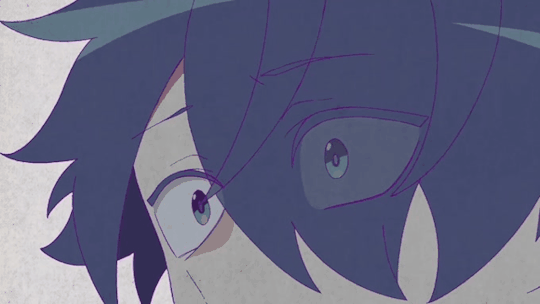
(AO3 Mirror)
A lot of people in the MILGRAM fandom (especially English-speaking MILGRAM fandom) state that Haruka is autistic-coded, as if it’s fact. Most recognize that Haruka is coded as disabled. (If you didn’t recognize that, I hope this post will help to explain why.) However, to state that he is coded as autistic specifically is incorrect. Haruka is coded as intellectually disabled.
Now, there are likely two things that contribute to this issue. One is the invisibility of intellectual disability as a whole, and another is the fact that a lot of this has to do with things that only someone who speaks Japanese would understand (such as complex vs non-complex words in Japanese).
In this post, I plan to lay out what an intellectual disability is and how it differs from neurodivergencies such as autism or ADHD. After that, I want to discuss the way Haruka speaks and uses words, the symbolism in his MVs, and how this lends to him being coded as intellectually disabled. Finally, I want to discuss why this even matters at all. Because, in truth, viewing Haruka as autistic instead of intellectually disabled leaves the viewer misunderstanding his story in a huge way that seems far too common in English-speaking MILGRAM fandom. So, I hope you listen to what I have to say.
What does it mean to be intellectually disabled?
Confusing autism and intellectual disability (henceforth referred to as ID) is not an issue unique to the MILGRAM fandom. They are quite commonly mistaken for each other, in the same way that autism and ADHD are both commonly mistaken for each other. And for the same reason, too – autism and ID are comorbid. This means that, if someone is autistic, they are more likely to have an ID. For this reason, it makes perfect sense to headcanon Haruka as autistic. I headcanon him as autistic, myself, actually. But, in this post, I’m going to be strictly talking about his coding, not headcanons, and he is very specifically coded with an ID.
So, what’s the difference? In the words of the National Institutes of Health, “Whereas ID is associated with general deficits across developmental domains, ASD is in fact defined by the observation that social communication deficits are particularly impairing.” (Source)
To say this in layman’s terms, autism is primarily characterized by difficulties in social communications. Cognitive abilities in autistic individuals vary, just like with allistic individuals, but the defining features are issues with social interaction and nonverbal communication. Autism by itself effects how effectively one communicates, but not intelligence. On the other hand, ID is a limitation on intellectual functioning, just like the name implies. This causes issues in areas like learning, problem-solving, and abstract reasoning.
A lot of people think ID is a synonym for ‘learning disability’. ‘Learning disability’ is an umbrella term that covers things such as dyslexia and dysgraphia. This isn’t the case. For one thing, ID can be a diagnosis on its own. ID is subdivided into syndromic ID, where intellectual deficits are present with other signs and symptoms, and nonsyndromic ID, where ID is, itself, the diagnosis. Examples of syndromic IDs include fragile X syndrome, and Down syndrome. For another, those with learning disabilities tend to have average to above-average intellectual abilities. Their disorder affects their ability to acquire and process information, but they are still able to learn. In contrast, ID affects the ability to learn at all, as well as affecting development and general function.
ID is a debilitating disorder. Many people with an ID cannot live independently, require help with self-care activities, and have limited communicative abilities. Understanding this – particularly, how ID is often a disability that requires a caregiver – is a key point to understanding Haruka as a character. But that’s to be covered later.
Words
The reason why this is a problem in the English fandom specifically is because the main thing tipping off the viewer to Haruka’s ID is the way that he speaks.
‘Weakness’, Haruka’s first-trial song, is written entirely in INCREDIBLY basic, elementary-level kanji – mostly hiragana and katakana. In fact, his first-trial song is misspelled in a lot of official releases of the song (‘Weekness’), which is a good way to get the same effect across. This is not the case across all platforms, though, for whatever reason. He also writes, in his trial 1 interrogation, with only that elementary-level kanji; often only one-word answers. The only complicated characters he knows are usually ones that mean something along the lines of, “I’m a stupid, idiot child,” which can be assumed to be because that’s what he has heard his whole life.
While I’m unsure if it is ENTIRELY in this basic kanji, his second trial song and interrogation is at least mostly written like this, as well. At this point, Muu is teaching him how to read and write (or, that’s what’s implied), but, even with that one-on-one attention, he is still speaking like a child most of the time to the Japanese ear.
When he’s forced to use or listen to words outside of this elementary-level kanji, he gets audibly confused, as well. In the AVIOT earbud collab, he has the voiceline, “Pairing seems to be in progress,” but, if you listen, he says “pairing” like it’s a question. (“Pair-ing?”) He doesn’t know the word is an English loanword that isn’t often used in everyday conversation, so he’s struggling to say it.
He also struggles when speaking to Es in his interrogations. He tries to say, “I will acknowledge any falsehood or silence,” but the words used are very advanced in Japanese. As such, he struggles with it, repeating, “False-hood? Si-lence?” Multiple similar exchanges happen in his interrogations, with Haruka misunderstanding words Es uses, and stuttering over unfamiliar words. The implication is that Haruka struggles with higher vocabulary or unfamiliar words, and with speaking and communication in general. He apologizes multiple times to Es for struggling, saying that he is not intelligent as an explanation multiple times. Additionally, in his second trial investigation, he talks about how he could never do the same things as everyone around him. When Es calls him stupid, he agrees. Es even states, “You really have no learning ability whatsoever.” When, mind you, having delayed or slowed learning is, like, the symptom of intellectual disability. It’s quite blatant. (Why is this not fandom consensus yet, again?)
Moving on from the point of how Haruka uses words, we can talk about other forms of word-based MILGRAM media. For example: when introducing himself, he says he thinks he’s 17, which implies that he isn’t actually sure. Additionally, there is lots of evidence for his intellectual disability in his interrogation questions:
He considers it impossible to learn another language
His dream is to ‘live normally’
He states he disappointed his father (not inherently an ID-related thing, but also, makes sense with his coding in mind)
Many answers imply that he’s been unable to live his own life, and he doesn’t really have any aspirations outside of being given attention
Finally, we have the lyrics to his songs. Again, on top of being written in very basic kanji, we have lines like the following, which include repeated themes of needing a caregiver (being ‘hopeless’ by himself), not being able to do what others can do, hating how he was born, and struggling to function. (I have bolded examples that I think are especially apt.)
“Why was I born like this? Why does it hurt so much?” / “Why was I born to be me? Why does it hurt so much?”
“Instead you kept calling me “hopeless” / You never called me by my name / You were always comparing me to someone else”
“If I tried and couldn’t say it, you would get angry at me and say “You’re hopeless”” / “When I tried to understand it, you’ll make that disappointed face again”
“I just wanted to be your good boy” (what did the MILGRAM team want us to think when they included this line? likely that he’s childish or ‘hasn’t grown up’, right?)
“Mommy, look / I’ve done great” (calling her ‘mommy’ instead of ‘mom’ – again, ask what the MILGRAM team wants us to think when they included this)
“If only I could do what anyone else could do”
“It’s enough, I am a “disappointment””
“My life started in a wrong spot”
With regards to his relationship with Muu, he doesn’t understand why Muu using him would be a bad thing, or how she is manipulating him. People with ID tend to have poor judgment, and Haruka not being able to tell the difference and not caring about the difference between negative and positive attention shows this (although his trauma definitely also plays a role).
Finally, we have the trial song titles.
We’ve already discussed how “Weakness” is sometimes alternatively misspelled as “Weekness”, and that is because the title in Japanese is, arguably, misspelled, too. The Japanese title is a play on the phrase jakuniku kyoushoku, which is equivalent to the English phrase, “Survival of the fittest.” More directly, it translates to, “The weak are meat, the strong do eat.” The character for “strong” (kyou) is replaced by “together” (also kyou) – with the implication being that Haruka forgot which version of the word was correct for this situation. This also works to create a pun, of sorts, as this makes the title more like, “The weak are meat, communal eating”, creating an emphasis on the fact that there are more people eating than there are ‘weak people’. There are differing ways to interpret this pun, but one way is to view it as a statement on Haruka’s status as a minority, oppressed (‘eaten’) by the majority.
On the other hand, we have All-Knowing and All-Agony. In Japanese, this song title is Zenchi Zennou, which can be translated as “Omniscient and Omnipotent”, used to describe the Christian God. Once again, we have what we can assume is Haruka misspelling the title, creating a pun. One that is much more on the nose, as the character for “ability” (nou) is replaced with the character for “worry, distress, pain” (also nou).
It seems that the reason why Haruka uses new complicated words (aside from the words meaning “idiot” and the like) in All-Knowing and All-Agony is because Muu is teaching him. It features the more complicated “食” (shoku; food), when we know from Haruka’s 2023 birthday portal that Muu is bringing him meals. It also prominently features Muu’s name, 夢 (yume; dream), which is more complicated, as well.
Imagery
Now, we get on to the non-verbal, more visually-based evidence for Haruka’s ID. Be prepared for a lot more images!
Going back to Muu teaching Haruka how to write: it’s not just clear in his usage of kanji, but also how he writes. Comparing his handwriting, it becomes much easier to read after Trial 2’s start, and his writing is soft and bubbly; much like a teen girl’s writing might be.
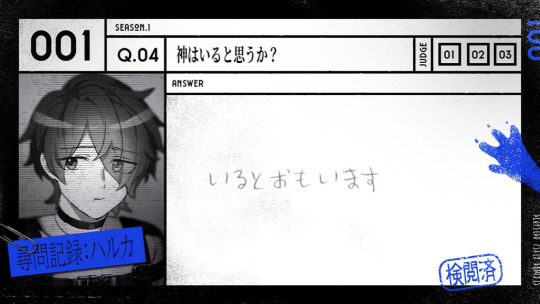

All of these improvements are able to be linked back to Muu (both his style of writing and in the more complicated words that he knows), who we know is looking after him. Considering this, it’s pretty clear why he sees her like a maternal figure.
One of the Minigram comics shows the prisoners eating curry udon together. Of the four shown (Amane, Haruka, Shidou and Mahiru), Amane and Haruka are the only two who make messes out of their clothes. Since the other two characters in the comic have active roles, and Haruka has the most passive one, Haruka’s inclusion can be assumed to be because he is the only prisoner aside from the child, Amane, who would make a mess while eating.

Childish themes and imagery are seen scattered throughout his MV, as well, especially his first one. He draws with the skill level of a child, which is a very prevalent motif, and he is shown to sleep with a plushie.
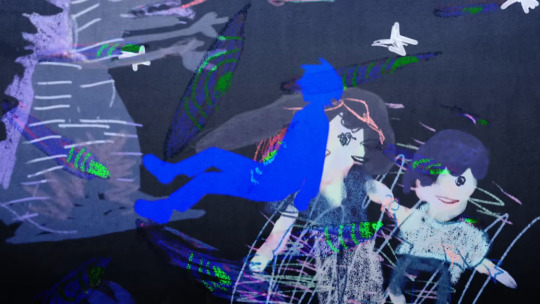
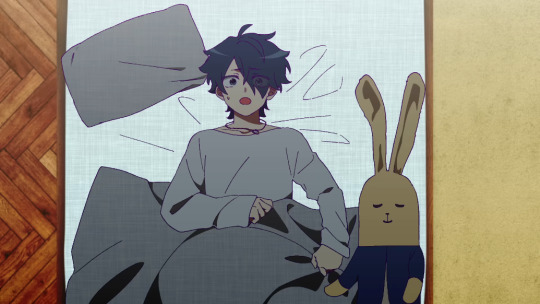
Additionally, he seems to have trouble putting on his clothes. He wears two entirely different socks – not just different colors, but also two different lengths. His pant legs are also two different lengths when he tries to roll them up in his Trial 2 art, and he seems to exclusively wear slip-on shoes up until he befriends Muu (where we can presume that she begins helping him, and even then, they're not done properly).
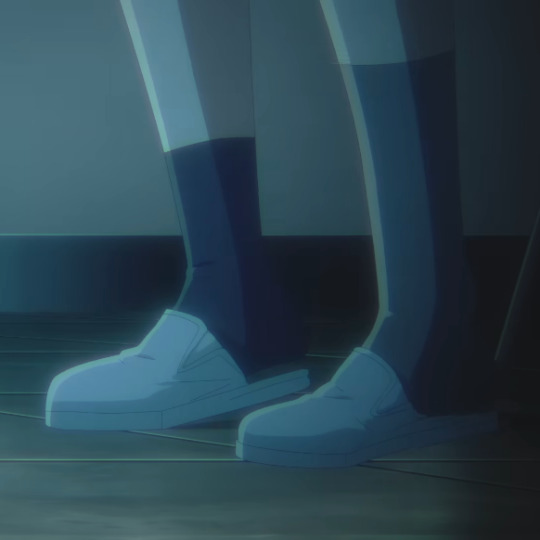

There are various visual parallels drawn between himself as a child and himself as he is now (for example, the way that his clothes are a mix of his current shirt and the vest he wore as a child in All-Knowing and All-Agony), and he often compares himself to a child wanting praise.

Even the violent acts that Haruka is shown committing are also a sign of an ID. People with IDs tend to have meltdowns, and devolve into fits of violence. The reasons for these meltdowns vary depending on the person, but reasons can include anger / frustration (especially in reaction to not being able to communicate well), sensory overload, and confusion.
You may note that Haruka’s mother reacts the exact wrong way for dealing with these meltdowns. When trying to help someone experiencing a meltdown, especially a violent meltdown, the last thing you want to do is appear frightened. The number one piece of advice everyone gives for helping someone experiencing a meltdown is to remain calm. It’s also not advised to leave the person alone, either, because that sends the message, “I want to avoid you when you feel this way.” (Which I suppose, for a neglectful mother like Haruka’s, would be technically accurate, but still not at all helpful.)
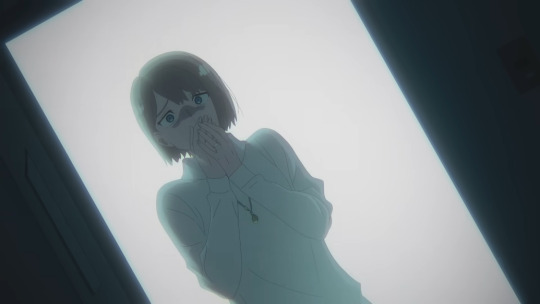
It only makes sense that Haruka’s tantrums continue to get worse and worse.

But after the meltdowns fade, he seems to not understand what he’s done. He’s shown experiencing fear and confusion after he hurts something, even shown as his child self at one point. A major part of IDs is being unable to connect actions to consequences.



Finally, we go onto his body language. Frankly, I considered putting, “Imagine this as a real person doing these things and not an anime boy, and you’ll see my point.” Which is true. But I decided to go a little more in depth.
Swaying is heavily associated with people with IDs. This is, in part, because people with IDs have reduced postural balance, and general body balance. Because of that lack of postural balance, people with IDs tend to slump quite heavily, as well. Both of these traits are shown very obviously with Haruka, in All-Knowing and All-Agony.


In the same MV, he’s also shown biting his nails. Like autistic people, people with IDs stim, and this could also be a version of hand mouthing (repetitive contact between the hands and the mouth / tongue), which is also heavily associated with / often seen in intellectually disabled people. He's also shown doing this in promo art.


So, why does this matter?
Haruka being intellectually disabled is a huge part of his story, and, when taking it into consideration, it changes how one views his story a lot.
Haruka being treated better as a child makes more sense with this framework. He wants to return to when he was a child because his level of intellect then was seen as more ‘normal’. There wasn’t as much obviously ‘wrong’ with him yet. Children are expected to be a little slow, but it’s when they remain that way that many parents begin to become concerned. He yearns for when his mother didn’t know he was disabled, and when she treated him better for that reason.
Haruka being severely neglected / abused by his mother would be awful, no matter what, but him being intellectually disabled makes it so much worse. He needs attention and care from his caregivers even more so than the average child does, because he has trouble even functioning on the day-to-day without help. This is why he thrives under Muu’s care; she is meeting his support needs. Likely not perfectly (she’s just a teenage girl, and she is almost certainly not trained or educated in this regard), but even with the amount of support that she is able to give, Haruka is thriving. He’s more confident, he’s learning how to write, and he’s eating more consistently.
Without that care, he struggles so severely that he melts down regularly, going into fits of violence over the fact that his support needs aren’t being met (on top of all of the other emotional baggage that comes with any child being neglected by their parent). Haruka’s mother continued to ignore these cries for attention, for help, for care… Until it went too far.
The way that Haruka’s story is viewed changes drastically with this information. If Haruka was autistic, it would affect very few of the things that I listed. So much of Haruka's story hinges on specifically his intelligence level, not how he socializes. And do you have any idea how many people I’ve seen say, “He’s a neurodivergent with a shitty mom, but so am I, and I didn’t kill anyone about it”? No. If you are not intellectually disabled, you do not get to compare your experiences as if they are equal. If you don’t have an ID, your experiences cannot be compared in this way.
Haruka has a debilitating disability that requires support which he was not getting. He was experiencing ableist abuse at the hands of his mother, and he didn’t know how to handle it. All of his violence happened during his meltdowns, and his disability makes it harder for him to connect his actions to the consequences, or find alternate ways to solve his problems – this is all extremely important information and context when you’re discussing whether or not his crime is forgivable.
If you still don’t forgive him, that’s alright. But to neglect this aspect of his character is, to be frank, baffling, if you’re trying to participate in the spirit of the series and understand everyone’s crime to the fullest extent. And to make jokes, comparing your own experiences to Haruka’s, since you assume him to be neurodivergent and nothing else, does a huge disservice to his story! And, when it’s done to demean him? It honestly comes off a slight bit ableist.
So, I’d like everyone to keep this information in mind moving forward. Don’t infantilize Haruka for his disability. But do consider this information in your analysis posts, your discussions, and so on. I’d like to see this become common knowledge in the MILGRAM fandom, especially since the idea of him being specifically autistic-coded is so widespread by this point.
Thank you!

#haruka sakurai#milgram#the milgram project#milgram meta#milgram analysis#intellectual disability#haruka#sakurai haruka#azure does a thing
623 notes
·
View notes
Text
I want y’all to know that there are no “intellectual disabilities”. intellectual disability is a singular diagnosis. Autism isn’t an intellectual disability, Down’s syndrome isn’t an intellectual disability, fragile X syndrome isn’t an intellectual disability. Yes, all these things CAN come with intellectual disability, but they aren’t intellectual disabilities.
Intellectual disability is a singular thing. Please take this into consideration.
537 notes
·
View notes
Text
youtube
Almost Aborted: Mia's story
#students for life#almost aborted#down syndrome#prenatal diagnosis#abortion#anti abortion#pro life#Youtube
10 notes
·
View notes
Text
mini love report — blade

relationship health diagnosis — 65%*

symptom one — fiercely protective
someone could accidentally bump into you and he'd be willing to kill them. they'd better hope it was on accident, or they'll receive a visit later that night, regardless of your de-escalation. ever since his flesh merged with an abomination, he's held nothing sacred. orders are wordlessly received and executed. so when you stumbled along, knocking him off his equilibrium in the process, he had to latch onto something. you ended up being that 'something.'
he isn't confident in his abilities as a romantic partner. he considers himself unsightly, a blight upon the universe itself. then there's you... doing whatever it is you do... like complimenting a house plant that's been growing well recently. how did he ever catch your attention? it's baffling. nonetheless, this self-perceived gap in value has him eager to prove his worth the one way he can — bloodshed.
kafka's taken to calling him your guard dog, much to his chagrin (he doesn't deny the claim). despite how it reduces him to little more than a weapon, he prides himself on his ability to keep you safe. he won't ever come outright and admit it, though; he knows it'd sadden you.
symptom two — OMS (old man syndrome)
two pop references in a single sentence is enough to make your elderly bf stare at you as if you've spoken another language. go easy on him, he isn't hip with the times. it isn't that he's ignorant to technology, he navigates it just fine. the social media aspect and the trends that come with it are another story. he's never cared for it. should silver wolf broach the topic in his vicinity, he tunes her out.
you, however, have been given the rare privilege of never being ignored. not even if you're explaining why you enjoy a game where you've indebted to a raccoon. you might think he's uninterested, given his poker face, but don't be fooled. he's quietly absorbing your every word. one night, you'll find a plush raccoon sitting on your bed. you have to give him points for effort.
symptom three — acquiescent
blade will do just about anything you ask. he defaults to your preferences on everything from activities together to your meals. for the longest time, you mistook this for apathy on his part. why doesn't he take the initiative to plan your dates? are you boring him? what if he's going along but not enjoying himself? these doubts are a permanent fixture on your mind. voicing these concerns will be one of the few times you've ever caught him off guard. he thought he was amassing Boyfriend Points (he didn't word it this way, but the interpretation is accurate enough). the news that his boyfriend point currency is in the negative comes as a surprise (once again, not his wording).
you won't receive an in-depth monologue detailing his feelings. perhaps that's for the best, since if that was the reaction you received, you'd think he was replaced by a doppelganger. instead, he tells you that he prioritizes your happiness above all else. you look back on it as a sweet moment. the remarkably candid confession stuns you into silence. it seems so obvious in retrospect. in your defense, your intergalactically wanted boyfriend is notoriously difficult to read.

primary area of concern
some moral gymnastics are required. there's no way you haven't seen the wanted posters — he won't sugarcoat the truth either. he's a stellaron hunter responsible for innumerable crimes. the same coarse hands that hold your face when he leans down to kiss you have ended lives. your views on the value of life are bound to diverge. it wouldn't be a passionate debate either, you're not changing his mind on the subject. the only life he values is yours and that's that.
additionally, there's the issue of encroaching madness. minor detail. you're an odd ingredient in the mara mix. there are occasions when you pacify it... but there are also instances where you ignite it. in the event of the latter, he absolutely refuses to be around you. fear is an emotion long lost to him, yet its faint echoes reverberate throughout at the thought of hurting you. you'll get updates from an unknown number (thanks kafka). nonetheless, that doesn't change the fact that your boyfriend will be radio silent for periods lasting from weeks to months.

prognosis
it's complicated. blade treats you like you're a doll made of porcelain, handling you with the utmost care. that doesn't the carnage he's left (and will continue to leave) in his wake. you bring out a tender side in him that withers the instant he leaves your side. his involvement in your life would be far from traditional, he isn't the type you bring him to meet your parents. still, whatever part you want from him, he'll give. whether it be his heart in a literal or a metaphorical sense.
he's loyal to a fault and would have a difficult time should you ever call the relationship quits. you'd have this faint feeling of eyes following you when you're out and about. additionally, when you get back in the dating scene, you'll find yourself frequently stood up. it'd be wise to handle his affection with care.

*the universe has tried (and failed) to wrench you apart (0-20) your friends are praying that you'll break up (21-40) 'well it could/has be worse' bargaining mindset (41-60) a lil messiness as a treat (61-80) pure and wholesome (81-100)
968 notes
·
View notes
Text

Happy Disability Pride Month!
The Disability Zebra for the Pride Animal series is finally here! (The series where I take requests and design animals based on flags) I designed this all the way back in March, and thanks to everyone's feedback, I was able to narrow it down! (Special thanks to @yomcloud for a lot of helpful notes :-]c) This will never be perfect, but I've gotten a lot of love and joy from myself and disabled friends seeing this little guy :-]
You can get this guy on Redbubble! For local conventions, I'll be selling this as stickers with the gray outline!
Fun Fact! Zebras are also used as a symbol to represent rare diseases! This is based on the quote "When you hear the sound of hooves, think horses, not zebras." In regards to what doctors should consider when diagnosing a patient. This ends up with many disabled people not getting the right diagnosis, being ignored, or their conditions not being researched enough. All this because something is considered "rare", when in fact people with these disabilities are still large in number, diagnosed or not- a lot of disabled people even feel that their diagnoses may even be more common than we think. Because of this, the animal has been embraced by what doctors may call "medical zebras", now being used to represent many different disabilities considered "rare" such as Ehler's Danlos Syndrome, CACP Syndrome, and many more!
If you are disabled or know someone who is disabled, this pride animal is for you! If you are or know someone who is considered a "medical zebra", I hope this zebra brings you joy!
#Disability Pride#Disability Pride Month#Disability Pride Flag#Ehlers Danlos Syndrome#Disability Zebra#Zebras#Pride Animals#The knee braces are optional btw! If anyone wants to draw this guy#ebonytailsart#Added the EDS tag because majority of our friends have it <3 and our partner suggested it#I do not have it but I am hypermobile and a cane user hashtag WIN#BTW the alt text window is so much better post publishing than if you do it before publishing what the hell
200 notes
·
View notes
Text
Everybody sit down and strap in, 'cause I have a doozy of a tale to share.
I've had anxiety for literally as long as I can remember. I've had periods of my life where it was so intense it became legitimately life-threatening (don't worry I promise this is going somewhere funny). And this was really bizarre because I have zero childhood trauma. Like, my family life is so idyllic it's almost comical. Therapists would do abuse screenings on me and look utterly baffled when I told them everything was fine at home. They'd interrogate my parents just to make sure I wasn't lying. I have one friend who I'm fairly sure believed I was just severely gaslighting myself when I said my family was great, school wasn't too stressful, and I've never lived in a dangerous neighborhood or experienced poverty.
Anyways, despite no one being able to figure out where my disorder was coming from, my doctors were able to help me manage the symptoms so that I would like, not die, and actually be able to finish high school. Which was awesome. Now fast forward to late 2021. My big sister (who has also had intense anxiety her whole life which no one could figure out why) is finishing up her doctorate and getting her physical therapist's license. Somehow, during all her studying and schooling, she finds out about this thing called Ehlers Danlos Syndrome, which explains literally everything that was going on with us. EDS is a connective tissue disorder that kinda fudges up your body in a whole bunch of little ways, including dysautonomia (episodes of very fast heart-rate that kick your body into fight-or-flight mode), and hypermobility (unusual flexibility). It's a spectrum disorder, so the severity of symptoms vary from person to person, but we definitely checked almost every box on the diagnostic list. My sister went to see a specialist, and yep, she was diagnosed EDS positive. She immediately calls my mom and goes "I know what's wrong with Niki" (thanks, sis, that's real encouraging lol). Initially we're like "okay Katie, that's nice" because honestly this kind of sounds like jumping at shadows, but I go in to see the specialist anyways just to make sure.
One consultation and diagnosis later, and suddenly my entire life makes perfect sense.
Now we get to the funny part. See, the diagnosis stuff happened in early 2022. So by the time late 2023 comes around and we're looking for a new dog (I promise this is relevant), we've been riding that chronic illness diagnosis for a while. Once again, my sister, ever the proactive one, decides she's going to help us get a new dog. She scours the adoption website, sends us photos of the cutest dogs available, and helps us make a decision. This is how we got Beverly, who has been an unstoppable force of chaos in our lives ever since we signed the papers (but she's also really cute so she can get away with it). Now on top of being a very excitable and anxious pupper, Beverly's got a weird little gimp in her hindquarters, which makes her sit all splayed-out and funny-looking, and while it doesn't seem to be causing her pain, we take her to a vet to get it checked out. Vet finds absolutely nothing. X-rays are taken and examined. Still nothing. At this point, they go "well, we could try a CT scan of her brain, which would run about $5,000, and maybe we could find something--" but my parents are already packing this dog into the car like "well that is a HARD nope." So we decide, look, Beverly seems happy and healthy, and those gimpy legs don't seem to bother her, so we'll just leave it be until it becomes clearer what's wrong with her because we do NOT have a cool $5,000 to throw around here.
Readers more astute than my family and I will likely have already figured out where this is going.
This morning, my mom is looking at Beverly sitting in her funny sprawled-out way, and something in her brain goes "wait...weird physical symptoms with no tracible cause that vets can see..." She does a bit of googling. Can dogs have EDS/Hypermobility? Yes. Yes they can. And the listed symptoms describe Beverly to a T.
So not only is my sister the one to finally figure out what's wrong with me, she also unknowingly got us a dog who has the exact same chronic condition as us. Meanwhile my poor dad, who is the only Normal Person in our house, is coming to terms with the fact that he is apparently just fated to always love chronically ill people and animals, and there's absolutely nothing he can do about it.
160 notes
·
View notes